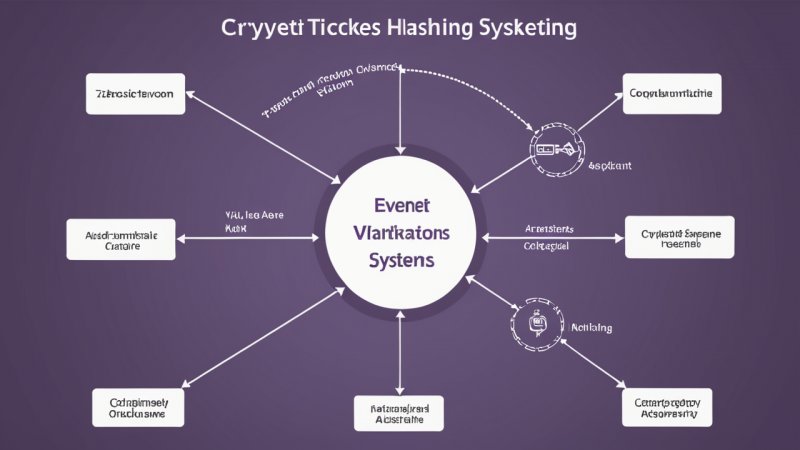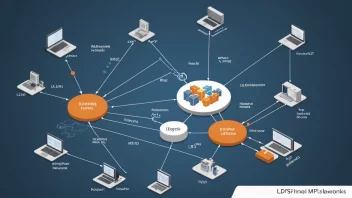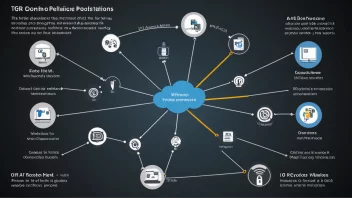Introduction
In this article, we will explore how to implement cryptographic hashing algorithms to ensure data integrity in cloud-based event ticketing and management systems. You'll learn about the importance of data integrity, the role of hashing algorithms, and step-by-step instructions for applying these techniques to your ticketing application.
Step 1: Understanding Cryptographic Hashing
Cryptographic hashing is a process that converts an input (or 'message') into a fixed-length string of characters, which is typically a sequence of numbers and letters. This output is known as a hash value or hash digest. The key properties of a cryptographic hash function include:
- Determinism: The same input will always produce the same output.
- Fast computation: It should be quick to generate the hash value for any given input.
- Pre-image resistance: It should be infeasible to generate the original input from its hash value.
- Collision resistance: It should be unlikely for two different inputs to produce the same hash value.
Step 2: Choosing a Hashing Algorithm
For cloud-based event ticketing systems, popular hashing algorithms include:
- SHA-256: A widely used cryptographic hash function that produces a 256-bit output.
- SHA-3: The latest member of the Secure Hash Algorithm family, known for its robust security features.
- RIPEMD-160: A lesser-known alternative that produces a 160-bit hash value.
For our implementation, we will use SHA-256 due to its balance of security and performance.
Step 3: Setting Up Your Development Environment
To implement hashing in your cloud-based event ticketing solution, ensure you have the following tools installed:
- A programming language: Use Python, JavaScript, or any language that supports cryptographic libraries.
- A cloud environment: Set up your application on a cloud service provider like AWS, Azure, or Google Cloud.
- Hashing library: Depending on your chosen programming language, install a hashing library. For example, in Python, you can use the built-in
hashliblibrary.
Step 4: Implementing Hashing in Your Application
Here’s how to implement SHA-256 hashing in Python:
import hashlib
def generate_ticket_hash(ticket_data):
# Convert ticket data to a string and encode it
ticket_string = str(ticket_data).encode('utf-8')
# Generate SHA-256 hash
ticket_hash = hashlib.sha256(ticket_string).hexdigest()
return ticket_hash
# Example ticket data
example_ticket = {'event_id': 123, 'user_id': 456, 'seat_number': 'A1'}
# Generate hash
hash_value = generate_ticket_hash(example_ticket)
print(hash_value)This function takes ticket data as input, encodes it, and returns the SHA-256 hash value.
Step 5: Storing and Verifying Hashes
Once you generate a hash for each ticket, store the hash in your database alongside the ticket information. When verifying a ticket, follow these steps:
- Retrieve the ticket data from your database.
- Re-generate the hash using the same method as before.
- Compare the newly generated hash with the stored hash.
- If they match, the ticket is valid; if not, it has been tampered with.
Step 6: Case Study
Let’s consider a fictional event management company, EventPro, which implemented SHA-256 hashing in their cloud-based ticketing system. Before implementing hashing, they experienced several cases of ticket fraud, leading to significant revenue loss and customer dissatisfaction.
By adopting cryptographic hashing, EventPro could ensure the integrity of ticket data. Each ticket issued was hashed and stored in their database. During entry at events, staff could quickly verify the validity of tickets by comparing hashes, reducing fraud and improving user trust.
Conclusion
In this article, we covered the importance of cryptographic hashing for data integrity in cloud-based event ticketing solutions. We walked through the steps of understanding hashing, choosing an algorithm, setting up a development environment, implementing hashing, and verifying ticket integrity through a case study.
By following these guidelines, you can effectively secure your ticketing system against fraud and ensure a trustworthy experience for your users. Always keep your hashing algorithms updated to mitigate potential security vulnerabilities.






